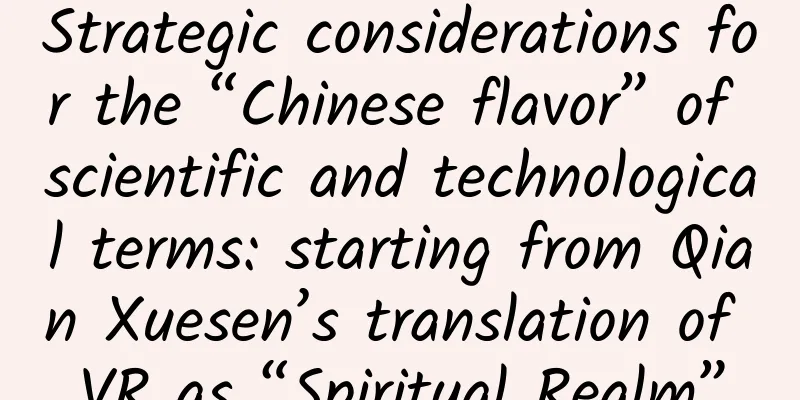Strategic considerations for the “Chinese flavor” of scientific and technological terms: starting from Qian Xuesen’s translation of VR as “Spiritual Realm”

|
In the recently announced "Chinese Review 2021" selection results, "Metaverse" was selected as the international word of the year, which shows the popularity of this word. Not long ago, when commemorating the 110th anniversary of Qian Xuesen's birth, the topic that Qian Xuesen had named VR (virtual reality) "Spiritual Realm" also caused heated discussions. "Metaverse" is translated from the English word metaverse, which is an abbreviation of the English words meta (originally meaning "transcendence", translated as "meta" in the computer field) and universe. Metaverse originated from the American science fiction novel "Snow Crash", which describes a virtual world called Metaverse. As long as people connect through a public entrance, they can enter it as a virtual avatar and start another life different from the real world. Image courtesy of the Qian Xuesen Library of Shanghai Jiao Tong University Looking at the blueprint of the "metaverse" drawn by various circles, the mutual mapping and interaction between the real world and the virtual world is its typical feature, and VR is its indispensable key technology. Recently, the Qian Xuesen Library of Shanghai Jiaotong University revealed that the famous strategic scientist Mr. Qian Xuesen gave VR a name in the early 1990s, "Spiritual Realm". In fact, he also named "teleoperation", "telesensation", "teleperception", "telepresence", "cyberspace" and so on in the same period. If this set of new concepts is organically combined, it is like a blueprint of the "metaverse". And this blueprint was drawn by Qian Xuesen more than 30 years ago. Eight years of obsession with the "spiritual realm" Qian Xuesen is a person who attaches great importance to the naming of scientific and technological terms. In November 1990, Qian Xuesen proposed the translation of VR for the first time in a letter to Wang Chengcheng, then the leader of the "863 Plan" Intelligent Computer Expert Group: "Artificial Scenery" or "Spiritual Scenery", and emphasized that "I particularly like 'Spiritual Scenery', which has a strong Chinese flavor." In June 1998, Qian Xuesen wrote back to the National Committee for the Examination of Scientific and Technological Terminology (abbreviated as the "National Committee for Scientific and Technological Terminology"), and after comparing "Linjing" and "Spiritual Scenery", he believed that "using Spiritual Scenery is realistic" and finally recommended "Spiritual Scenery." What is not known is that in the eight years between these two letters, he also mentioned and enthusiastically promoted the new name he created for VR - "Spiritual Scenery" in more than 10 letters to scientific researchers, journal editors, language workers and his own relatives. Image courtesy of the Qian Xuesen Library of Shanghai Jiao Tong University Image courtesy of the Qian Xuesen Library of Shanghai Jiao Tong University Although the term "spiritual realm" was not widely used in academia at that time, it obviously triggered the rich imagination of Qian Xuesen, a strategic scientist. In October 1994, he wrote in a letter to Dai Ruwei, Wang Chengcheng, Qian Xuemin and others: "Spiritual realm technology is another technological revolution after the computer technology revolution. It will trigger a series of changes that will shock the world and must be a major event in human history." He also attached a blueprint of his imagination: "Spiritual realm technology" will trigger "image thinking" and "inspiration thinking", promote "great improvement in creative ability", and "great wisdom" and "information network" will promote "great development of science" and "great development of literature and art", and even trigger a "technological revolution". Qian Xuesen named VR "Spiritual Realm" because of his "obsession" with the "Chinese flavor" of scientific and technological terms. In August 1993, he wrote to Zhu Guangya, "The translated word should be Chinese and have a Chinese flavor." In May and September 1994, he wrote to Wang Chengcheng twice, saying: "In the past, people directly translated it as 'virtual reality'", which was "too lacking in Chinese cultural flavor." "The Chinese translation of foreign terms should indeed be cautious, and it should at least show the thousands of years of Chinese culture. ... We are patriotic!" In November of the same year, he wrote to Yang Chunding, "I always think that our country has its own cultural traditions. Foreign terms cannot be translated directly, otherwise they will not have a Chinese flavor. They must be Chinese!" According to the author's research, there are three interpretations of "lingjing" in "ancient language": one refers to "a marvelous realm", as seen in Liu Zongyuan's "Jieweiyan Water Curtain": "The spiritual realm is indescribable, and the work of ghosts is hard to find", describing the miraculous waterfall scenery; the second refers to "an illusory realm", such as Ji Xiaolan's "Yuewei Caotang Notes" mentioned in "Ji Meng Shis": "Where is the spiritual realm, how many times have I dreamt of wandering now"; the third refers to "a realm of few people", such as "Entering Tang to Seek Dharma and Pilgrimage" describes the desolate scene of temples after the destruction of Buddhism in the fourth year of Huichang of Emperor Wuzong of Tang Dynasty: "There are spiritual realms everywhere, no one comes and goes, and no one sends offerings." It is difficult to say that Qian Xuesen has locked on to a certain interpretation, but it is more like a combination of the "illusory" and "marvelous" meanings of "ling" and the "realm" meaning of "jing" to form the reduplicated word "lingjing". "Ling" and "jing" are attributive structures, one virtual and one real in semantics, and the word formation is clever. In Qian Xuesen's mind, "Spiritual Realm" has not been without challenges. In May 1994, he wrote to Wang Chengcheng: "I suggested using the poetic 'Spiritual Realm'. Now I think this may be too 'literary'. ... 'Linjing' sounds the same as 'Spiritual Realm', but it is easier to understand and has its advantages." Indeed, VR technology is a combination of virtuality and reality. People can get a real feeling of being in the virtual world, and the two-character "Linjing" is also a classic phrase - "immersive". In the end, although Qian Xuesen gave up "Linjing" "because this realm is virtual, not real", he did not classify "Linjing" as a word that has no "Chinese flavor" after all. Qian Xuesen profile photo Why was the “Spiritual Realm” not adopted? The National Committee for the Examination of Scientific and Technological Terms is an authoritative organization established with the approval of the State Council and authorized by the state to examine and publish terms. In order to ensure the authority and currency of scientific and technological terms, the National Committee for the Examination of Scientific and Technological Terms will, in principle, try to adopt the naming opinions with higher consensus among experts at the time. The scientific and technological community did not reach a broad consensus on the name "Spirit Realm" at the time, which was the main reason why this now highly respected scientific and technological term was not adopted as a standardized name by the state at the time. The Chinese names of VR, in Guangming Daily in 1996 and 1997 alone, included "virtual reality", "immersive", "virtual reality", "electric image", "virtual image" and "spiritual realm". The journal "Science and Technology Terminology Research" (now called "Chinese Science and Technology Terminology"), sponsored by the National Science and Technology Terminology Committee, opened a special column to discuss the Chinese standard name of VR at the beginning of its publication in 1998. At that time, nearly 20 translation suggestions were made by the academic community, including "virtual reality", "virtual reality", "virtual reality", "virtual image", "zero realm", "immersive", "simulated reality", "simulated reality", "virtual reality", "fantasy reality", "virtual realm", "virtual reality", "virtual reality", "virtual reality", "real reality", etc. The experts who participated in the column discussion at that time were powerful, but there were also many different opinions. The more typical naming opinions include "spiritual realm" by Academician Qian Xuesen, "virtual reality" or "spiritual realm" by Academician Wang Chengcheng, and "virtual reality" by Academician He Zuoxiu and Jin Wulun. The three reservations raised by Academician Hu Qiheng on "Spiritual Realm" are quite representative: "It is too far away from the original meaning in English", "It may cause misunderstanding of the mysterious and magical realm that has already emerged in modern science and technology", and "It cannot cope with a large number of similar nouns". When experts have major differences of opinion on a certain naming, the naming opinion with a higher degree of consensus among the alternative options (such as "virtual reality") will often win out in the discussion, be adopted by the country, and become the standard name used by scientific research, teaching, production, business and news publishing units across the country. The “Chinese flavor” of scientific and technological terms Qian Xuesen created many new Chinese scientific and technological terms. He once commented on himself: "It is indeed necessary to be cautious in translating foreign terms into Chinese, so that thousands of years of Chinese culture can be reflected in them. I am constantly working hard in this regard. There are successes, such as laser, aerospace, space shuttle, and aerospace plane, but there are also failures, such as my original suggestion to translate 'Black Hole' into 'Light-trapped Star'." When Qian Xuesen talked about his opinions on the naming of scientific and technological terms in his letters, he often mentioned words such as "Chinese flavor", "Chinese flavor", "Chinese cultural flavor", "Sinicization", "Chinese cultural tradition", and "Chinese style". He very much hoped that China's new scientific and technological terms could better reflect the Chinese scientific and technological cultural traditions and the Chinese language and cultural traditions. The "Chinese flavor" of scientific and technological terms advocated by Qian Xuesen is similar to the principle of "Chinese characteristics" in the principles of scientific and technological terminology review of the National Committee on Science and Technology Terminology. This principle is listed after the principles of "univocity, scientificity, systematicity, and coordination" and is parallel to the principle of "internationality". It is intended to emphasize that the naming of scientific and technological terms must conform to the characteristics of Chinese, and make good use of scientific and technological terms that reflect Chinese traditional culture and Chinese characteristics to express scientific and technological concepts. For example, the astronomical terms "Venus" and "Jupiter" are named "Jinxing" and "Jupiter" instead of "Eros" and "Hercules". In addition, in the past 30 years, the National Committee on Science and Technology Terminology has organized scientific and technological experts from both sides of the Taiwan Strait to jointly name new elements, using the method of selecting or creating new phono-semantic characters from existing ancient characters, such as the Chinese names of elements 115-118 "镆", "See Figure ①", "See Figure ②", "See Figure ③", etc., which is also another example of the principle of Chinese characteristics. Scientific and technological terms have the dual attributes of science and technology and language, and the level of scientific and technological development and language expression ability jointly affect the international status of a country's scientific and technological language. When leading the development of scientific and technological innovation, Qian Xuesen always remembered to create good Chinese names for new concepts in a timely manner. The many classic names he created played an immeasurable and important role in the rapid popularization of these cutting-edge scientific and technological concepts. The author calls on Chinese scientists to spend more time to give new scientific and technological concepts a good name as soon as possible in the great journey of building a strong country in science and technology in the new era, in addition to immersing themselves in scientific and technological innovation. At the same time, confidently communicating in Chinese in the field of science and technology, confidently writing articles in Chinese in scientific and technological journals, giving full play to the unique charm of Chinese terminology, and telling Chinese terminology stories well should also become the strategic consciousness of the Chinese scientific and technological community in the new era to enhance cultural confidence, promote the spread of Chinese terminology, and then seize the initiative in the competition for world scientific and technological discourse power. Optimizing the naming of new scientific and technological terms More than 30 years have passed, and the term "metaverse" has suddenly become extremely popular, and Qian Xuesen's translation of "spiritual realm" has also returned to the public eye and is highly respected. This phenomenon has prompted us to think about how to guide the scientific community to form relatively reasonable recommendations when new concepts have not yet solidified? How to optimize the naming of new scientific and technological terms? At a time when the competition for the right to speak in science and technology is intensifying, this is probably an issue of the times that cannot be avoided. The author believes that, on the one hand, the country must institutionally ensure that attention is paid to the naming and trial release of new scientific and technological terms in scientific and technological planning and project implementation, so as to create positive conditions for the country to advance the work on scientific and technological terminology to the forefront of science and technology, to control the entry of new concepts from the source of scientific and technological innovation, and to promptly grasp the initiative in naming new scientific and technological concepts; on the other hand, it is necessary to discover a large number of high-level experts among the vast group of scientists who are active in the frontier of science and technology, have both scientific and technological literacy and language literacy, and are good at naming scientific and technological concepts and popularizing science, so as to promptly discover, study and promote the timely naming and popularization of new scientific and technological concepts. All relevant units should also incorporate the contribution of the scientist group to the work on scientific and technological terminology into the national and unit evaluation system for scientific and technological talents. Recently, the local scientific and cultural sources of the rationale for naming scientific and technological terms, represented by "spiritual realm", have largely resonated with the whole society. Qian Xuesen may have been inspired by the "spiritual realm" to form his thoughts on "image thinking and inspirational thinking", and then he came up with the strategic concept of "thinking science" and technology triggering "great scientific development" and "great cultural development". From this point of view, the strategic significance of naming scientific and technological terms in the frontier fields of science and technology and at the core concept level cannot be underestimated. We need to have a deeper understanding of Mr. Qian Xuesen's strategic considerations and his deep love for Chinese traditional history and culture when he was diligently pursuing the "Chinese flavor" of scientific and technological terms. Authors: Zhang Hui and Pei Yajun, respectively deputy director and director of the National Committee for the Examination of Scientific and Technological Terminology Affairs Center Guangming Daily (Page 05, December 26, 2021) |
<<: Not all sharks are so vicious!
>>: Incredible! In just 25 steps, a chip can turn skin into blood vessels and nerve cells
Recommend
How should new operators find the key points of APP product operation!
When we operate a new APP or product, a common pr...
Why is it not called iWatch because of poverty? Apple, you’ve had enough
Most of Apple's product lines are named "...
[Grain Policy of a Great Country] Deep Sea Aquaculture 2.0: Using Technology to Unlock the "New Copy" of the Blue Granary
[Grain Policy of a Great Country] Deep Sea Aquacu...
Case analysis: Marketing and promotion methods of an offline education and training institution
The case analysis brought is the marketing promot...
Research shows that developers are using user moods to get more five-star reviews
In 2008, when Apple announced the launch of the A...
For the first time in history! Audi voluntarily admits monopoly: willing to be punished
The Economic Information Daily reporter learned o...
In-depth | How to start new media operations without a budget?
How to start new media operations without a budge...
The magical "Sarebo" and the noble "Jiusi Zheer"
In the middle of Lushan Scenic Area in Xichang, t...
The most romantic thing I can think of is looking up at the stars with you...
"The stars are twinkling, the moon is round....
2020 Tesla Impact Report
Tesla's 2020 Annual Impact Report shows that ...
Yi Zhongtian's Chinese History: An Lushan Rebellion
After the Anshi Rebellion, people could only dream...
To promote Internet finance products, how to plan and develop H5 mini-games?
If a product is created to solve a certain pain p...
618 headline traffic forecast and advertising suggestions!
618 headline traffic estimation & delivery su...
If you want to play short videos, you also need to know these
Mobile video is coming of age. The " Mobile ...









